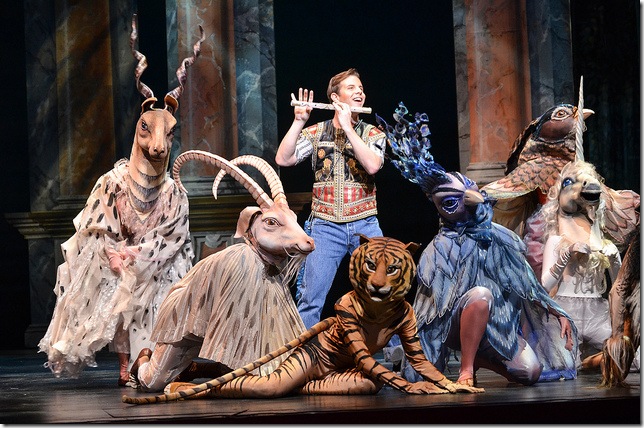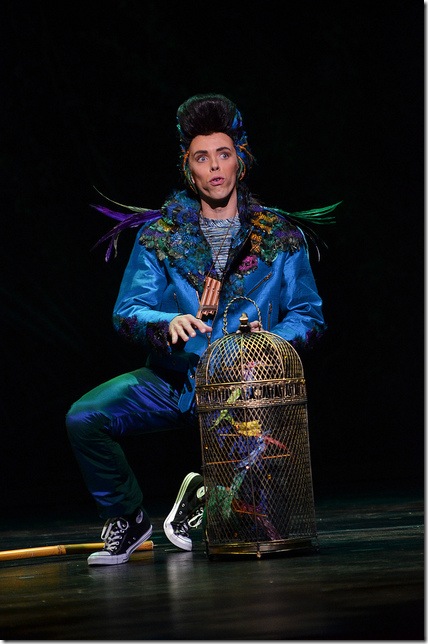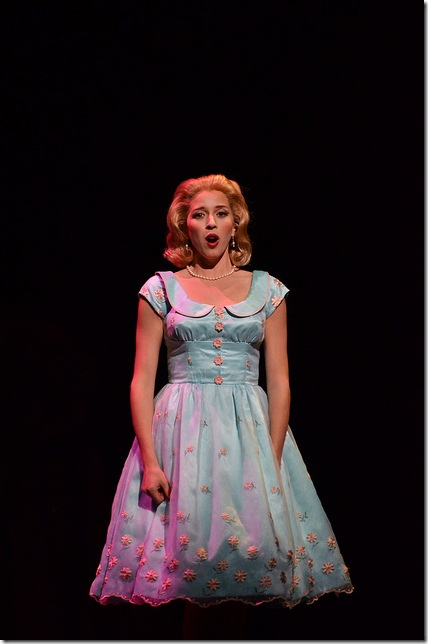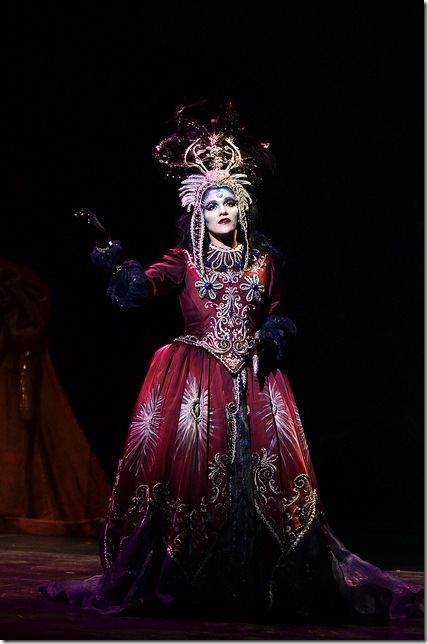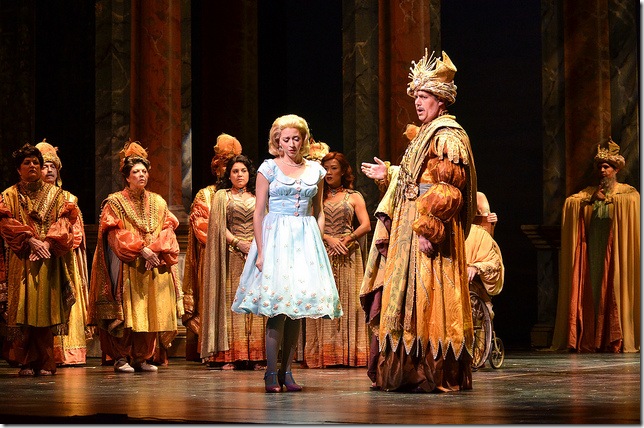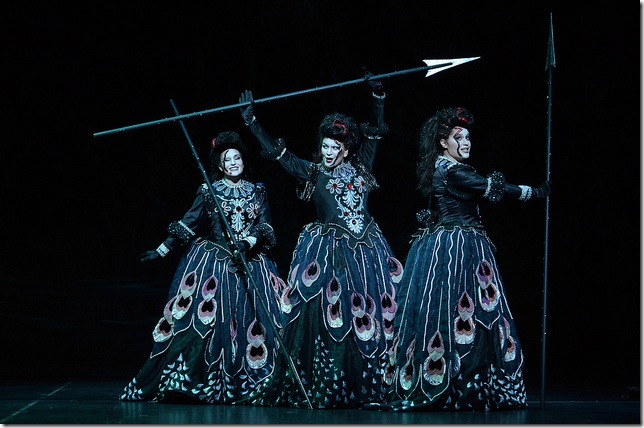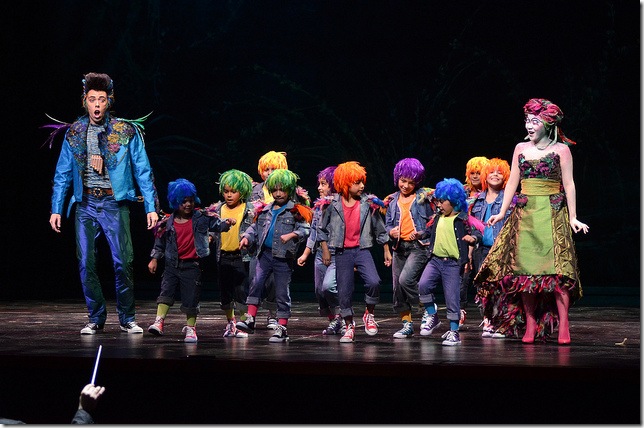Because of its high content of fantasy and madcappery, Die Zauberflöte has always offered its presenters an irresistible opportunity to take any number of theatrical risks, confident that Mozart can take it.
He can, and while the just-closed Florida Grand Opera production of Mozart’s great 1791 singspiel played it relatively safe from that standpoint, it nevertheless maintained a strong level of genial invention, brought winningly home by excellent lead performances, as demonstrated in the final show Saturday night at the Broward Center in Fort Lauderdale.
Much the most memorable was that of Papageno, sung and acted here by the American baritone Jonathan G. Michie, whom I’ve seen and admired in several other FGO productions. The central conceit of Jeffrey Marc Buchman’s charming framing of this opera was to set it in mid-1950s American suburbia, with the action apparently taking place as a particularly elaborate dream had by Tamino.
That left Papageno as a sort of greaser birdcatcher, with electric-blue leather jacket, black sneakers and jeans, and a jumpy, frenetic stage presence, an idea that allows a lot of audience buy-in but that could also become tedious. But Michie was marvelous, a delightful Papageno from his first appearance who did what every good comic needs to do, and that’s seize the audience’s attention every second the spotlight is on him.
He is also a fine and distinctive singer, with a strong, clear voice that has just the right flexibility to be able to go from tomfoolery to poignancy persuasively. His Ein Mädchen oder Weibchen was lovely, and his voice in the Bei männern duet with Pamina blended attractively with hers. He also understands how not to overdo things. There was a funny joke for the Baby Boomers in the scene with the old crone, Papagena in disguise, when he asked, in German: Mrs. Robinson, are you trying to seduce me?, which may have been a bit much, but Michie made it work, and work well.
Pamina was sung by the Louisiana-born Cuban-American soprano Lisette Oropesa, and she sang beautifully. Oropesa has a lovely, powerful voice, with a big top and strength throughout her whole register, and an ability to add believable pathos and sadness to her singing, particularly in her very fine Ach, ich fühls, which is when she most needs it.
It is also a voice with warmth and richness, and that made Oropesa’s Pamina a sympathetic figure, rather than a dreary, lovelorn sop. Her acting was believable and sincere, and she looked delectable in her blue cocktail dress, platinum-blond wig and pink shoes. But most of all, you wanted to hear her sing some more.
She was well-matched by her Tamino, tenor Andrew Bidlack, another FGO veteran. He has a creamy, pretty tenor that sounded earnest without the slightest sense of being pushed. It sounded youthful, confident and engaging. From his Dies Bildnis in Act I to his Wir wandelten durch Feuersgluten duet with Oropesa in Act II, his voice was a pleasure to listen to at all times.
He was a persuasive actor as well, even in pantomime in his bedroom, which sat to the left in the early scenes and returned for the beginning and ending of Act II. He made more of the role than being an admirable stiff, and he and Oropesa made a good-looking, and good-sounding, couple.
Jeannette Vecchione, whose backstory – she is a champion New York state basketball player whose talent for singing was discovered in a school choir — is remarkable enough in itself. But as the Queen of the Night, she showed that she is enviably gifted in the vocal department as well. And this is true even though it was only the Der Hōlle Rache showpiece that she really brought her “A” game.
Her first entrance, for example, was impressive but not overwhelming, and there is ample reason to prefer someone in this role that has a much bigger voice. But even there you could hear that Vecchione has a voice of almost uncanny lightness in the stratosphere register, an instrument of remarkable ease that she can apparently make do what she wants without obvious effort.
In the Der Hōlle Räche, she added heft and purpose to her singing, and knocked out those high Fs right on the money; she even added one, and a high D after it, by going up instead of down on the second go-round of the famous chorus. It was exactly like watching an amazing sports feat in the Olympics, and the audience at the Broward Center went out of its mind, shrieking its approval then and at the curtain call.
The Sarastro for this production was bass Jordan Bisch, whose large, sonorous upper register was quite attractive in his two big arias, and In diesen heil’gen Hallen in particular. It’s a forceful, bronze voice that commands attention, which is well-suited for this part. But his lowest register, and Sarastro sings down there a good bit, was soft and almost distant Saturday night, and one wished for a little bit more profundo presence.
Tenor Matthew Maness, who played Monostatos, made a good villain from an acting perspective, particularly in having to sing the role without seemingly wearing much in the way of clothing. His singing was pleasant, but was rather dry and had little weight, and so his character didn’t make much of an impact other than a visual one. As Papagena, the South Korean soprano Hye Jung Lee was fine in her small role, though her speaking voice was very soft and poorly projected, and it was hard to make out what she was saying in her scenes with Papagena. Her singing, though, was quite attractive, and her light, delicate voice made a sweet partner with that of Michie in the Pa-pa-pa duet.
The Three Ladies – soprano Lacy Sauter and mezzos Cynthia Cook and Carla Jablonski – were very good, with a fine vocal blend and a funny stage presence, dressed almost like Wizard of Oz guards, spears and all. Adam Lau, who was a good Colline earlier this season in FGO’s La Boheme, sang the Speaker with a rich, deep voice that has a big lower compass that would have been useful for Sarastro. Other good singing came from the two armored guards in Act II, Matthew Newlin and Ryan Milstead, who sang this wonderfully prophetic, almost Romantic music with real flair.
Newlin and Graham Fandrei were decent as the two priests, if somewhat rigid in their acting, while the three Spirits – Andres Larrea, Charles Vega and Salvador Blanco – were somewhat weak vocally. They did an admirable job, but their voices were a little too overmatched by the orchestra and difficult to hear.
Andrew Bisantz led the proceedings well, with an excellent FGO orchestra to back things up. The choral singing was generally good, and special mention should be made of choreographer Rosa Mercedes, who must have had great fun staging things such as Das klinget so herrlich, when Monostatos’ cronies went into Chippendale’s-style dance moves that had the audience howling, so much so that this clever little tune could barely be heard for all the laughter.
There were other comic, adroit things such as the fourth-wall moment early on when a gagged Pamina, unable to answer Papageno, pointed to the supertitle above her head, which read: Would you mind untying me? And in the Pa-pa-pa duet, a horde of little children dressed like Papageno in various colors of neon hair came out to join their future parents and do attention-hogging dance moves. A blatant appeal for audience support, but adorable nonetheless, and the crowd loved it.
This was a handsome production, if still rudimentary when it came to some of the props and set pieces, such as the trials by fire and water. Camilla Haith and Howard Tsvi Kaplan’s costumes were a clever mix of 1950s and fantasy (especially the forest animals and the various getups of the three Spirits, which included Lindbergh-style aviator caps and scarves at one point), and the scenery from New York City Opera invited suspension of belief.
Buchman has to be given a lot of credit for his smart, sweet staging, which allowed clowning and a love story to coexist happily, in large part because the middle-America setting is one of warm nostalgia that an audience eagerly embraces. It was a fast-moving, delightful night at the theater, one with plenty of invention to go along with its moralizing; a production, in other words, wholly congruent with the spirit of Mozart.
